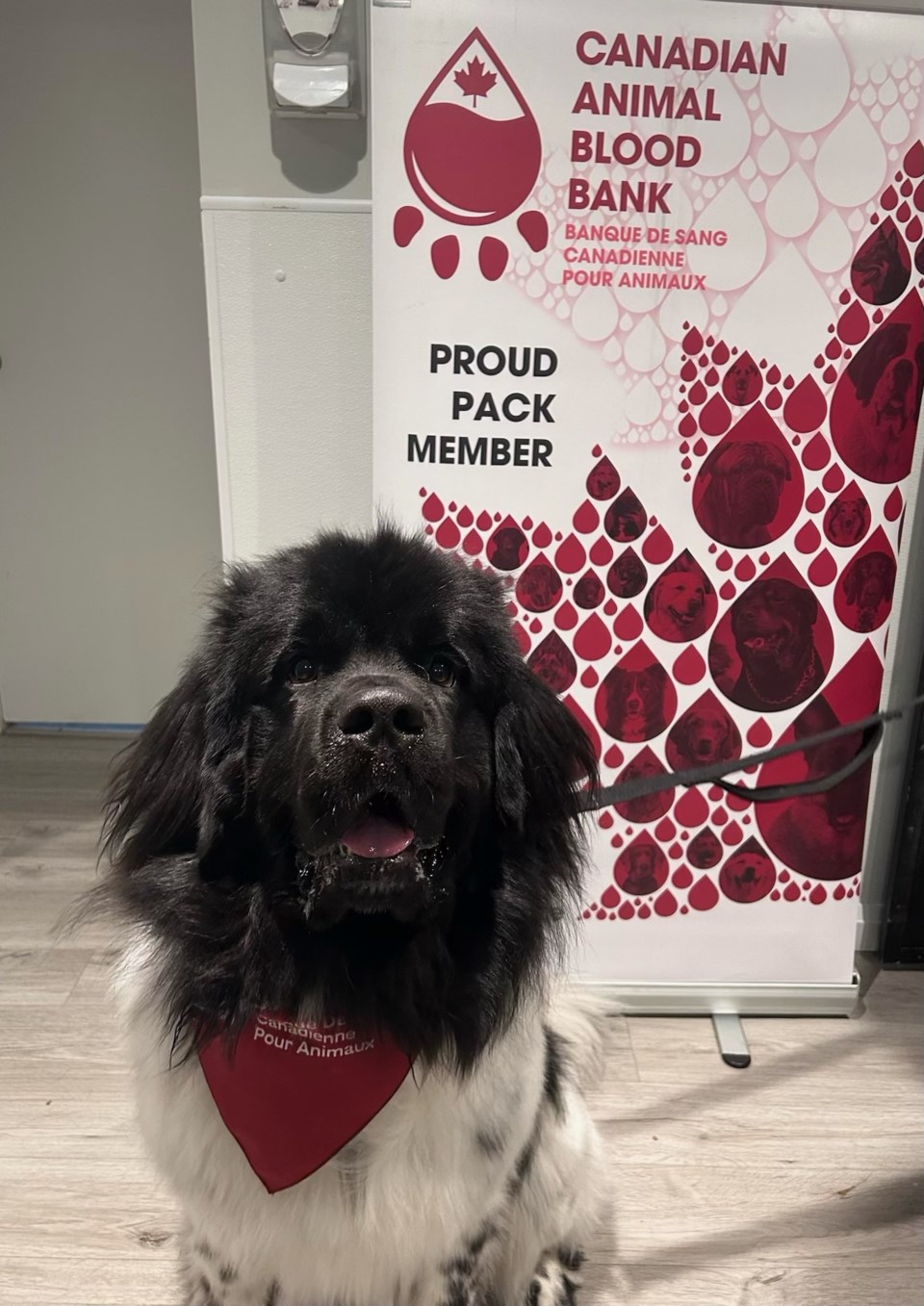Many dog owners are unaware their beloved pets could be bona fide heroes in waiting. Yes, they can roll over, shake a paw, fetch their toys, perhaps even close doors.
But did you know, if they meet the criteria set out by the Canadian Animal Blood Bank (CABB), dogs can also donate blood and consequentially, save up to three dogs?
Waterdown’s Sharon Hall, who fosters standard poodles through Standard Poodles in Need, discovered CABB through veterinarian Dr. Michelle DaCosta of Watzin Veterinary Clinic on Hamilton Street North.
“I had never heard of it before, like many others,” said Hall. “Dr. DaCosta treated and knew that my foster at the time was big enough and that poodles tended to be the universal blood type.”
With permission from the rescue organization, the first of many of her subsequent qualifying fosters was booked into the clinic.
“I couldn’t believe how simple and gentle the process was. It’s rewarding. You get to meet like-minded volunteers and owners and you get to play with hero dogs,” said Hall, who is now a volunteer for CABB.
Dogs who qualify are healthy with an even temperament; weigh 55 pounds or more and are between 1and 8 years old.

Dogs can donate every three months and in her experience, most end up becoming regular donors after that first experience, said DaCosta.
Appointments are booked in half hour increments, but the collection process is less than five minutes with time leftover for cuddles and treats, according to the CABB. Once collected, the blood is packaged and stored at a central hub, in Watzin’s case, the Burlington Veterinary Emergency and Referral Hospital until it’s needed for a critically ill dog; that dog can be from anywhere in Canada.
Most blood products are used at emergency and specialty hospitals - which is where dogs are sent for elevated levels of care - as opposed to general practices, but there have been a few instances where Watzin required emergency blood, including for several “deathly sick puppies,” from a rescued litter of five, said DaCosta.
“It was CABB blood that allowed them to live,” said DaCosta.
Other emergency situations where transfusions might be required include trauma incidents such as a dog being hit by a car, certain surgeries, cancer therapy support, rat poison toxicity, anemia and parvovirus treatment.
Watzin Veterinary Services became a host clinic for CABB blood donor sessions several years ago. The Manitoba-based organization was in fact, established in 1996 and today has depot locations within several emergency veterinary hospitals across the country, including three in Alberta, two in Manitoba, three in Ontario, one in Quebec and as of January, Nova Scotia. Blood products are shipped across Canada to veterinarians who need it,
The Hamilton area has been a great source of donations for CABB with 12 partnering veterinary clinics across the region, including three in Waterdown, said Nicole Arruda, CABB’s development manager for eastern Canada.
“I think dog owners are slowly becoming more aware as our presence here grows and word of mouth does its thing,” said Arruda.
Recruiting efforts have increased with CABB representatives attending more industry-specific events such as the recent Canadian Pet Expo and “utilizing the pet-loving community to spread the word”: veterinary hospitals, pet stores, groomers and others, said Arruda.
Blood donor clinics are held every three to four months at participating vet offices and typically “open their doors to eight or more doggie donors per clinic day.”
Just like humans, dogs have different blood types and some are more typically universal donors, but all dogs who qualify are welcome.
The need is great because so many more people are taking advantage of the medical advances that veterinarians can provide today, said DaCosta.
“A lot of pet owners want to take those next steps whereas 15 or 20 years ago we wouldn’t have had these opportunities to continue or use advanced medicine on these pets. Now we can and a lot of owners are open to it,” said DaCosta.
Emergency clinics usually order extra blood for holiday periods such as Christmas, said Arruda, because donor clinics shut down and in case of shipping disturbances.
“As with any holiday, pet emergencies tend to increase in numbers during these times; perhaps this is due to people having a lot going on. After years of working in emergency vet medicine, I can vouch for this,” said Arruda.
To register your dog as a blood donor, visit www.canadiananimalbloodbank.ca or email [email protected]
